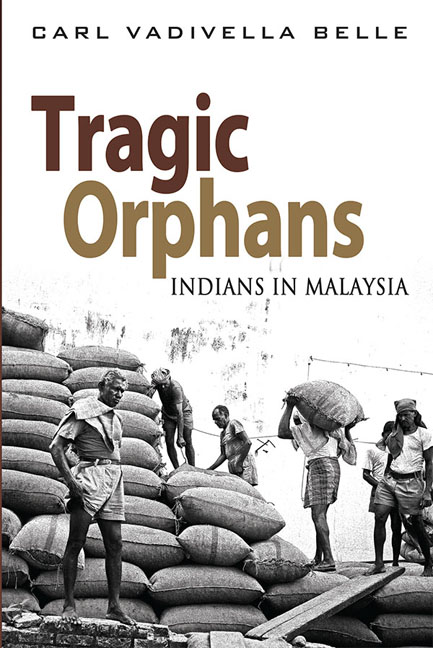Book contents
- Frontmatter
- Contents
- Acknowledgements
- List of Abbreviations
- Introduction
- 1 The Malay Peninsula: Early History, Melaka and the Colonial Setting
- 2 European Colonialism and the Malay Peninsula
- 3 India and the Development of British Ideologies of Empire
- 4 British Governance of Malaya
- 5 Slavery and Indentured Labour
- 6 Indian Indentured Labour in Malaya
- 7 Kangany Labour in Malaya
- 8 Other Indian Immigration
- 9 Indian Political Development to 1941
- 10 The Japanese Invasion, Subhas Chandra Bose and Indian Wartime Nationalism
- 11 The Post–war Period: Reform and Repression: 1945–48
- 12 From Federation to Merdeka
- 13 From Malaya to Malaysia: Singapore, 13 May and the New Economic Policy
- 14 The Mahathir Years: A Changing Malaysian Landscape
- 15 Abdullah Badawi, Islamization, and the Rise of Hindraf
- 16 Najib and 1Malaysia: A New Deal?
- Conclusions
- Bibliography
- Index
12 - From Federation to Merdeka
Published online by Cambridge University Press: 06 June 2017
- Frontmatter
- Contents
- Acknowledgements
- List of Abbreviations
- Introduction
- 1 The Malay Peninsula: Early History, Melaka and the Colonial Setting
- 2 European Colonialism and the Malay Peninsula
- 3 India and the Development of British Ideologies of Empire
- 4 British Governance of Malaya
- 5 Slavery and Indentured Labour
- 6 Indian Indentured Labour in Malaya
- 7 Kangany Labour in Malaya
- 8 Other Indian Immigration
- 9 Indian Political Development to 1941
- 10 The Japanese Invasion, Subhas Chandra Bose and Indian Wartime Nationalism
- 11 The Post–war Period: Reform and Repression: 1945–48
- 12 From Federation to Merdeka
- 13 From Malaya to Malaysia: Singapore, 13 May and the New Economic Policy
- 14 The Mahathir Years: A Changing Malaysian Landscape
- 15 Abdullah Badawi, Islamization, and the Rise of Hindraf
- 16 Najib and 1Malaysia: A New Deal?
- Conclusions
- Bibliography
- Index
Summary
THE EMERGENCY
The war against the Chinese-dominated MCP, known as the Emergency, endured for twelve years — from 1948 to 1960. The insurgency claimed the lives of 6,697 members of the Malayan National Liberation Army (MNLA), while a further 3,000 surrendered and 1,286 were captured by security forces. On the government side, 1,865 members of the security forces, mainly Malays, were killed, and a further 2,560 wounded. A total of 2,473 civilians, mainly Chinese, died in the insurgency. Over 12,000 personnel passed through the ranks of the MNLA. Despite the high financial and human toll the British had no intention of withdrawing from their most valuable colony. In 1948 rubber brought $120 million into the sterling zone, and by 1952–53, following the Korean War boom, Malayan exports were providing 35.26 per cent of Britain's balance of payments within the dollar area. Moreover, the retention of the Singapore naval base was regarded as essential in projecting Britain's military posture as a great power within Southeast Asia.
In launching the insurrection, the MCP adopted the essential principles of Leninist theory, namely creating a revolutionary situation, vitiating the machinery of government and exsanguinating its military power, and assuming party control of all state functions both during and after the revolution. The military campaign was planned around the theories of protracted revolutionary war developed by Mao Tse-tung and based on his experiences in China. The MCP programme failed dismally. The MNLA's actions were often poorly coordinated and frequently concentrated upon immediate military outcomes rather than the political agitation and education necessary to create a climate of widespread popular support. The MNLA never seriously threatened British rule.
A unified strategy for defeating the MCP was developed by a retired general, Sir Harold Briggs, who was appointed Director of Operations on 21 March 1950. Briggs realized that the early failures of the British counter-insurgency could be largely attributed to a dearth of reliable intelligence and the fact that the British neither understood the Chinese community, nor acknowledged their permanency within the Malayan political landscape. He also drew attention to the existence of the two complementary strands of the MCP, namely the MNLA and the Min Yuen (Mass Organisation, which worked among the civilian population), and the role ascribed to each.
- Type
- Chapter
- Information
- Tragic OrphansIndians in Malaysia, pp. 265 - 298Publisher: ISEAS–Yusof Ishak InstitutePrint publication year: 2014

